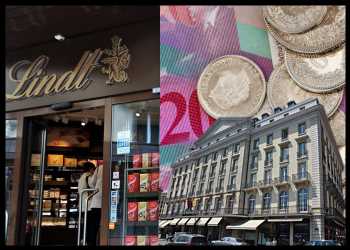Switzerland’s economy expanded at a slower-than-expected pace in the third quarter as high inflation weighed on consumer spending, official data showed Tuesday.
The economy registered a sequential growth of 0.2 percent in the three months to September, following the second quarter’s downwardly revised 0.1 percent rise, the State Secretariat for Economic Affairs, or SECO, in Bern reported.
Economists had forecast the gross domestic product to grow 0.3 percent, the same as the second quarter’s initially estimated expansion.
Compared to the same quarter last year, growth in GDP eased notably to 0.5 percent from 2.2 percent in the preceding quarter. Growth was expected to moderate to 1.0 percent in the third quarter.
Driven by the spending on housing and energy and leisure and travel, household consumption grew 0.7 percent despite a relatively high inflation. Nonetheless, the growth rate was slower than the 1.3 percent rise a quarter ago.
At the same time, the government spending gained 0.2 percent after staying flat a quarter ago.
With the easing of international supply bottlenecks, investment in equipment and software investment increased at a faster rate of 2.1 percent, while the decline in construction investment deepened to 2.0 percent from 1.1 percent.
Exports of goods rebounded 7.8 percent following a 13.5 percent decrease. Meanwhile, growth in exports of services slowed to 2.0 percent from 6.6 percent.
At the same time, imports of goods climbed 3.0 percent, reversing a 0.7 percent drop, and imports of services gained at a faster pace of 7.8 percent after rising 3.3 percent.
The production-side of GDP showed that the service sector delivered broad-based growth. On the other hand, some of the cyclical industrial sectors were held back by the international environment.
The Swiss economy is likely to slow further in the fourth quarter, although any recession will probably be shallower than previously expected, and shallower than in neighboring Germany, Capital Economics economist Andrew Kenningham said.
In the autumn economic forecast, the government had downgraded its growth outlook citing a tense energy situation and surging inflation. The economy was projected to grow 2.0 percent this year and 1.1 percent in 2023.
For this year, the Swiss National Bank also forecast GDP growth of around 2 percent.
Source: Read Full Article
-
‘The Tinder Swindler’ Filmmakers Felicity Morris & Bernadette Higgins Sign With Anonymous Content
-
Letterboxd, A Big Booster Of Indie Films, Is Acquired By Canadian Investment Firm Tiny
-
Donald Trump Mugshot: See Booking Photo After Former President’s Arrest In Georgia
-
European Economic News Preview: Spain GDP Flash, Eurozone Lending Data In Focus
-
Kayla Tausche Says She’s Leaving CNBC

